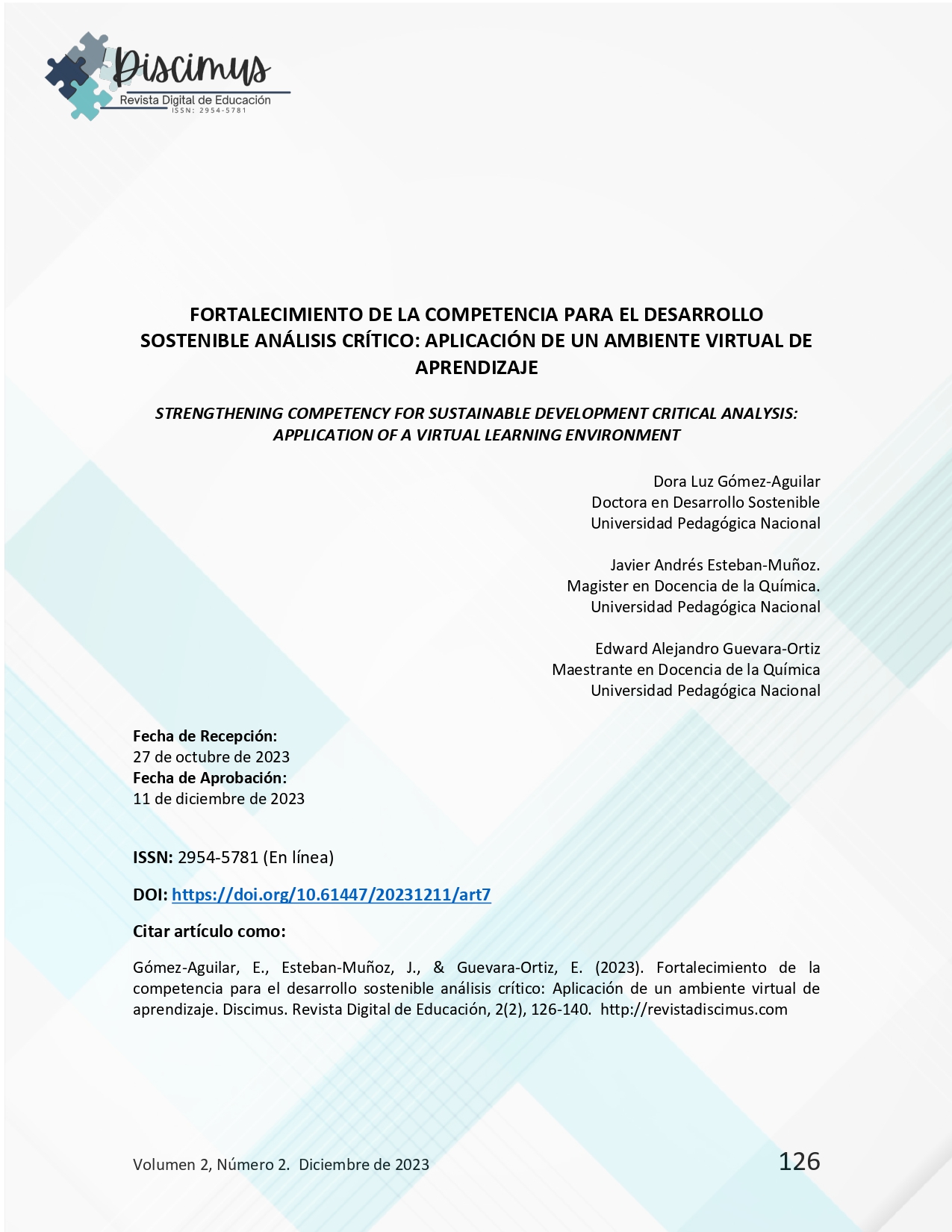Strengthening competency for sustainable development critical analysis: application of a virtual learning environment
Main Article Content
Abstract
Education for Sustainable Development provides students with values, attitudes and knowledge in order to provide alternative solutions to the social, environmental and economic challenges that may be occurring in the present and in the future. The objective of this article is to illustrate the process of strengthening the competence for sustainable development Critical Analysis, which is made up of the components of critical thinking, ethical and intellectual commitment; this development was carried out through the implementation of a Virtual Learning Environment, which consisted of three modules related to: the pollution of the Tunjuelo River, the Tannery Industry in San Benito and the Hybrid Method (which involves the use of chemical precipitation with Magnesium Oxide and the use of a solid residue from the Wet-Blue tannery industry for the removal of chromium in wastewater from the tanning stage). The type of research paradigm was qualitative, with a descriptive scope, which was developed with a group of Initial Teacher Training, belonging to the Bachelor's Degree in Natural Sciences and Environmental Education of the Public Pedagogical University of Kennedy; to evaluate the strengthening of this competence, three indicators are presented (1- Understands that knowledge is incomplete and is tinged with subjectivity; 2- Understands that every system (economic, social and environmental) presents dysfunctions that can be identified and corrected 3- Recognizes the social, economic and environmental dysfunctions that oppose sustainable development, Proposes alternatives for improvement) and their respective levels, according to the answers provided by the participating population. Within the results obtained there is evidence of a progression in the levels from passing to outstanding, which make up the indicators.
Downloads
Article Details
Section

This work is licensed under a Creative Commons Attribution-NonCommercial-ShareAlike 4.0 International License.
Open Access Policy at Discimus Journal
Discimus Journal is committed to the promotion of free circulation of scientific and academic knowledge, simultaneously ensuring appropriate acknowledgment for our authors while adhering to the ethical principles of scientific publishing. In alignment with this goal, Discimus publishes all its articles under the ATTRIBUTION-NONCOMMERCIAL-SHAREALIKE 4.0 INTERNATIONAL CC BY-NC-SA 4.0
How to Cite
References
Barth, M., Godemann, J., Rieckmann, M., & Stoltenberg, U. (2007). Developing key competencies for sustainable development in higher education. International Journal of Sustainability in Higher Education, 8(4), 416–430. doi:10.1108/14676370710823582
Cebrián, G., Junyent, M., & Mulà, I. (2020). Competencies in Education for Sustainable Development: Emerging Teaching and Research Developments. Sustainability, 12(2), 579. doi:10.3390/su12020579
Corona Lisboa, J. L., (2018). Investigación cualitativa: fundamentos epistemológicos, teóricos y metodológicos. Vivat Academia, (144), 69-76. https://doi.org/10.15178/va.2018.144.69-76
Luengo, J., Luzón, A y Torres, M. (2008). Las reformas educativas basadas en el enfoque por competencias: una visión comparada, Profesorado. Revista del currículum y formación del profesorado, 12(3), pp. 1-10.
Mathar R. (2015) A Whole School Approach to Sustainable Development: Elements of Education for Sustainable Development and Students’ Competencies for Sustainable Development. In: Jucker R., Mathar R. (eds) Schooling for Sustainable Development in Europe. Schooling for Sustainable Development, 6, Springer, Cham. https://doi.org/10.1007/978-3-319-09549-3_2
Mochizuki, Y., & Fadeeva, Z. (2010). Competences for sustainable development and sustainability. International Journal of Sustainability in Higher Education, 11(4), 391–403. doi:10.1108/14676371011077603
Murga-Menoyo, M. A. (2015). Competencias para el desarrollo sostenible: las capacidades, actitudes y valores meta de la educación en el marco de la Agenda global post-2015. Foro de Educación, 13(19), 55-83. http://dx.doi.org/10.14516/fde.2015.013.019.004
Naciones Unidas [UN] (2021). Objetivo 4: Garantizar una educación inclusiva, equitativa y de calidad y promover oportunidades de aprendizaje durante toda la vida para todos. https://www.un.org/sustainabledevelopment/es/education/
UNESCO (2021). Educación para el desarrollo sostenible. https://es.unesco.org/themes/educacion-desarrollo-sostenible.

